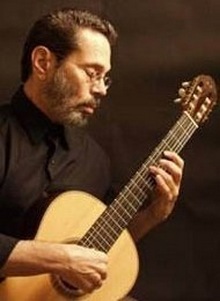Leo Brouwer’s mark on Cuban cinema
- Submitted by: admin
- Arts and Culture
- Caribbean
- Cinema
- culture an traditions
- history
- Music
- national
- personalities
- 03 / 04 / 2009

Through ICAIC’s (Cuban Institute for the Arts and Movie Industry) Group of Sound Experimentation (GES), Brouwer contributed to the renewal of sound language through new explorations decisive for the development of Cuban contemporary music during the 1970’s. Testimony to his work as head of the Group were scores composed by Silvio Rodríguez, Pablo Milanés and Sergio Vitier, among others, for Cuban fiction movies and documentaries, a rooting and fusion of Cuban cinema with the New Trova Movement.
Next March, the Instituto Cubano del Arte e Industria Cinematográficos (ICAIC) will celebrate its fiftieth anniversary and Leo Brouwer will have two things to celebrate. The author of one of the best known musical works in the history of Cuban cinema turns 70.
Brouwer was born into a family of musicians: his grandmother was the composer Ernestina Lecuona, the sister of Ernesto Lecuona. When he was a student he had great teachers such as Isaac Nicola, as well as having been trained at the Julliard School of Music and the University of Hartford, in the United States.
Leo Brouwer has left a deep mark on the Cuban and Latin American contemporary sound universe through his solo instrument, the guitar, as well as his orchestral direction and above all through composition. At the same time he has also acquitted himself as a teacher of the talented.
Linked to Cuban cinema since its very beginning, he created the music for movies of such directors as Julio García Espinosa, Oscar Valdés, Sergio Giral, Enrique Pineda Barnet, Manuel Octavio Gómez, Manuel Pérez, Humberto Solás and Tomás Gutiérrez Alea "Titón". Years later he directed ICAIC’s Group of Sound Experimentation, in which Silvio Rodríguez, Pablo Milanés, Noel Nicola, Emiliano Salvador, Leonardo Acosta, Sara González, Eduardo Ramos and Sergio Vitier, among others participated. Through GES Brouwer contributed to the renewal of sound language through new explorations decisive for the development of Cuban contemporary music during the 1970’s. Testimony to his work heading the Group were the scores composed by Silvio Rodríguez, Pablo Milanés and Sergio Vitier, among others, for Cuban fiction movies and documentaries, a rooting and fusion of Cuban cinema with the New Trova Movement.
Leo Brouwer also helped to define the profile, the projection and aesthetics of cinema when he was part of the production team of the first full-length film of the national movie industry. He wrote the music for La batalla de Santa Clara (The Battle of Santa Clara), the third chapter of Historias de la Revolución (Histories of the Revolution) by Tomás Gutiérrez Alea. For years he continued working with Titón in a partnership that elaborated, from a movie’s dramatic conception, the spirituality of its music as can be appreciated in classic movies like Memorias del subdesarrollo (Memories of Underdevelopment), La última cena (The Last Supper) and Los sobrevivientes (The Survivors), among others.
Brouwer’s work was also decisive in key pieces of Humberto Solás´ filmography such as Lucía and Cecilia. The music of an epic movie by Manuel Pérez, El hombre de Maisinicú (The Man from Maisinicú) is also his, as is the music of one of Cuba’s anthological documentaries: Vaqueros del Cauto (Cowboys of the Cauto) by Oscar Valdés.
(www.cubanow.net)
Comments